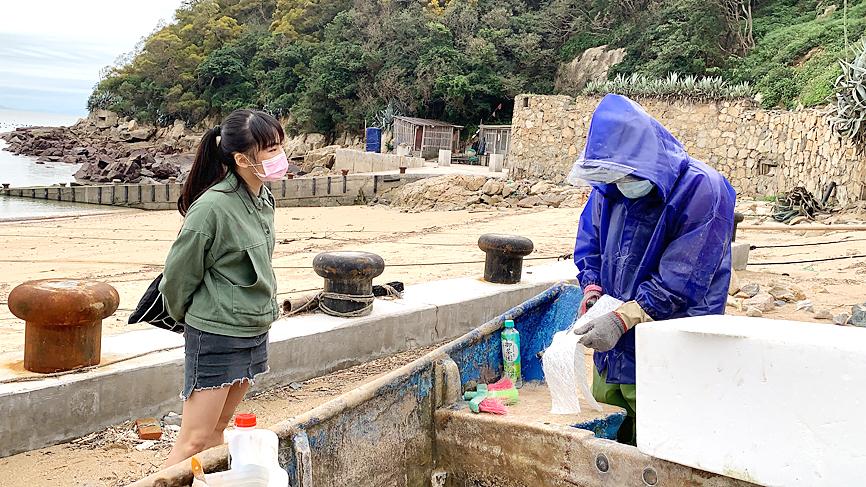A Lienchiang County resident is striving to keep a local language alive through her YouTube channel.
Tsao Chen-ying’s (曹辰瑩) weekly program is teaching people about the eastern Min (閩) language known as Fuzhouhua (福州話), which was long ago one of the daily languages heard on the Matsu Islands. On her channel, she documents her efforts to self-learn the language and leads discussions about Fuzhouhua’s history.
Tsao said that daily conversations on Matsu have been carried out in Mandarin since 1945, when the Chinese Nationalist Party enforced the language until 1987, during the Martial Law era.

Photo: CNA
As a result, elderly people are not likely to speak Fuzhouhua with younger generations, who are less likely to understand it, she said.
While Fuzhouhua originated in the eastern Min region, it underwent changes in pronunciation and vocabulary that make it distinct to Matsu. It is officially listed by the government as the “Matsu [variant of the] Eastern Min Language.”
Tsao said that older generations tend to believe that teaching the language was useless and could lead to the younger generation being ostracized for their accent.
Tsao said that although she grew up on Matsu, she had only understood the language but could not speak it.
Tsao said the inspiration for her program came from her wish to better converse with her grandmother in the language, adding that the COVID-19 period provided a good opportunity to learn the language.
She said that her program sought to convince older people that speaking the language is an act of identifying with the local culture.
Tsao said that one should not learn their native language just because it is offered at school.
Trying to self-learn a language is difficult, she said, but the effort and the mistakes make the language more impressionable, compared with being taught a language in class.
Tsao said she has significantly improved her proficiency, which has positively affected those around her, adding that people she knows are making more efforts to speak the language with her and are realizing that the language has a place in the culture.
An upcoming episode of her program is to feature elementary-school principals discussing their thoughts on the government policy to include teaching Fuzhouhua at schools, she said.
Tzao’s channel can be found on YouTube by searching “掐米亞店.”

Costa Rica sent a group of intelligence officials to Taiwan for a short-term training program, the first time the Central American country has done so since the countries ended official diplomatic relations in 2007, a Costa Rican media outlet reported last week. Five officials from the Costa Rican Directorate of Intelligence and Security last month spent 23 days in Taipei undergoing a series of training sessions focused on national security, La Nacion reported on Friday, quoting unnamed sources. The Costa Rican government has not confirmed the report. The Chinese embassy in Costa Rica protested the news, saying in a statement issued the same

Taiwan’s Liu Ming-i, right, who also goes by the name Ray Liu, poses with a Chinese Taipei flag after winning the gold medal in the men’s physique 170cm competition at the International Fitness and Bodybuilding Federation Asian Championship in Ajman, United Arab Emirates, yesterday.

A year-long renovation of Taipei’s Bangka Park (艋舺公園) began yesterday, as city workers fenced off the site and cleared out belongings left by homeless residents who had been living there. Despite protests from displaced residents, a city official defended the government’s relocation efforts, saying transitional housing has been offered. The renovation of the park in Taipei’s Wanhua District (萬華), near Longshan Temple (龍山寺), began at 9am yesterday, as about 20 homeless people packed their belongings and left after being asked to move by city personnel. Among them was a 90-year-old woman surnamed Wang (王), who last week said that she had no plans

TO BE APPEALED: The environment ministry said coal reduction goals had to be reached within two months, which was against the principle of legitimate expectation The Taipei High Administrative Court on Thursday ruled in favor of the Taichung Environmental Protection Bureau in its administrative litigation against the Ministry of Environment for the rescission of a NT$18 million fine (US$609,570) imposed by the bureau on the Taichung Power Plant in 2019 for alleged excess coal power generation. The bureau in November 2019 revised what it said was a “slip of the pen” in the text of the operating permit granted to the plant — which is run by Taiwan Power Co (Taipower) — in October 2017. The permit originally read: “reduce coal use by 40 percent from Jan.